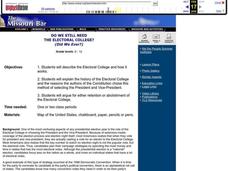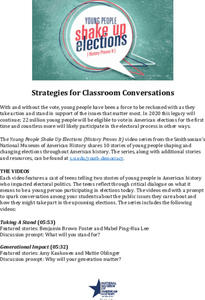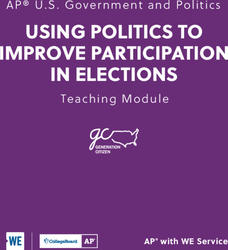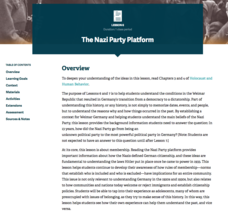iCivics
Mock Election
Here is an excellent resource in which class members host a mock election for a candidate and policy that will be implemented into your very own classroom. Progressing from primaries, through the campaign trail, and finally to the mock...
iCivics
Mini-Lesson: Midterm Elections
Find out the differences between presidential and midterm elections with an informative resource. Pupils discuss the importance of midterms to the presidency and how midterms affect the balance of government branches. They also fill out...
Curated OER
Do We Still Need the Electoral College?
One of the most confusing aspects of any presidential election year is the role of the Electoral College. Learners read a bit about how the Electoral College works and then they hold a mock election in their classroom. They'll redraw a...
Carolina K-12
Making First Vote Your Vote: Designing a Schoolwide Election
Encourage pupils to design an election plan for the entire school. They participate in a Board of Elections, create polling rules, discuss election controversies, write questions about the issues, run the election through an online...
Center for Civic Education
The Culminating Activity: Simulated General Election
What does a polling place look like, and what do poll workers do? Learners take what they have learned about voting procedures and role-play as poll workers in a simulated election activity.
iCivics
Students Power Elections
A Students Power Elections resource guide provides would-be voters with the guidance they need to become voters. Included in the packet is information about voter registration and voting, how to research candidates and ballot measures,...
Smithsonian Institution
Young People Shake Up Elections (History Proves It) Educator Guide
Vote, it's your civic duty! The resource provides several videos about voting in the United States. Scholars watch a series of topics ranging from youth participation to civic action. The educator's guide provides teachers with...
College Board
Using Politics to Improve Participation in Elections
Instructors new to teaching AP U.S. Government and Politics classes, as well as seasoned veterans, will find this teaching guide an invaluable resource. Using a project-based approach to civics education, the lessons emphasize real-world...
Encyclopedia Britannica
Beyond a Two-Party System
Young political scientists go beyond the two-party system and research third-party candidates running in the 2020 US Presidential election. Groups present background information about the candidate, the party's platform points, and a...
Encyclopedia Britannica
Becoming US President
It's that time of year, and the year. Once again the race is on for the White House. It's important that young voters, and would-be voters, understand the process for becoming the United States President. Class members research the...
Annenberg Foundation
Student Voices
Whether it's an election year or not, a unit on voting patterns and political campaigns will awaken the civic pride in your high school citizens. Divided into six parts, the curriculum covers various facets of an election, including...
Carolina K-12
Minnesota v. White: Exploring a Judicial Candidate’s First Amendment Rights
After watching a documentary on the Supreme Court case Republican Party of Minnesota v. White, class members research how the First Amendment and free speech issues influence judicial elections and then conduct a mock judicial election.
Curated OER
Citizens of the Future
Young sociologists explore how local, state, and federal governments work. This very impressive and ambitious lesson requires pupils to contact government officials who represent them and their families. They research elections, and hold...
Facing History and Ourselves
The Nazi Party Platform
Not all party platforms stay democratic. A resource covers many political issues in Germany during the time of World War II, and teaches pupils about the Nazi party platform and what went wrong. Individuals participate in a warm-up...




